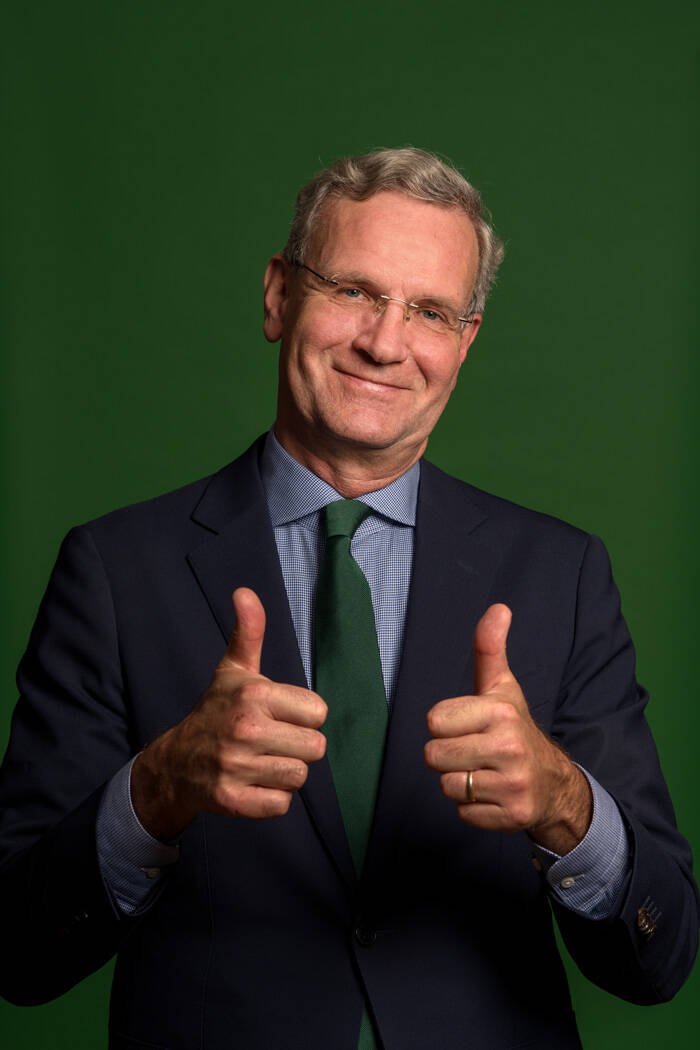The Dutch Queen Maxima visiting Eosta looking at a pineapple with a True Cost price tag
“The wealth gap is another big problem that can't wait. The old normal says that we need genetic engineering, fertilizers and pesticides to keep food affordable for the less fortunate, for example to produce enough food in Africa. But let's avoid exporting the short-term profit model to Africa. Feeding the world starts with a fair distribution of wealth. It will not improve if we make the developing world even more dependent on first world suppliers of fertilizers, agrochemicals and genetic engineering. The yield improvement they claim is often realized on the back of soil fertility, biodiversity and the disease-resistant capacity of crops. If we really want to help, we should stimulate their own revenue model instead of that of the suppliers.”
What can and should we change in the short term?
“We need to accelerate phasing out intensive agriculture and the parasitic agrochemicals, fertilizer and animal feed suppliers. At the same time, we must stimulate nature-inclusive circular agriculture in which people and the environment stand central. This is perfectly possible and has been sufficiently proven by organic farming. This automatically means that we limit our meat consumption to the amount that a closed loop system allows. If we do so, we’ll have no food problem at all. We’ll have a conversion problem. If we eat plant-based food, we can use ten to twenty times as much of our food.”

© ANP
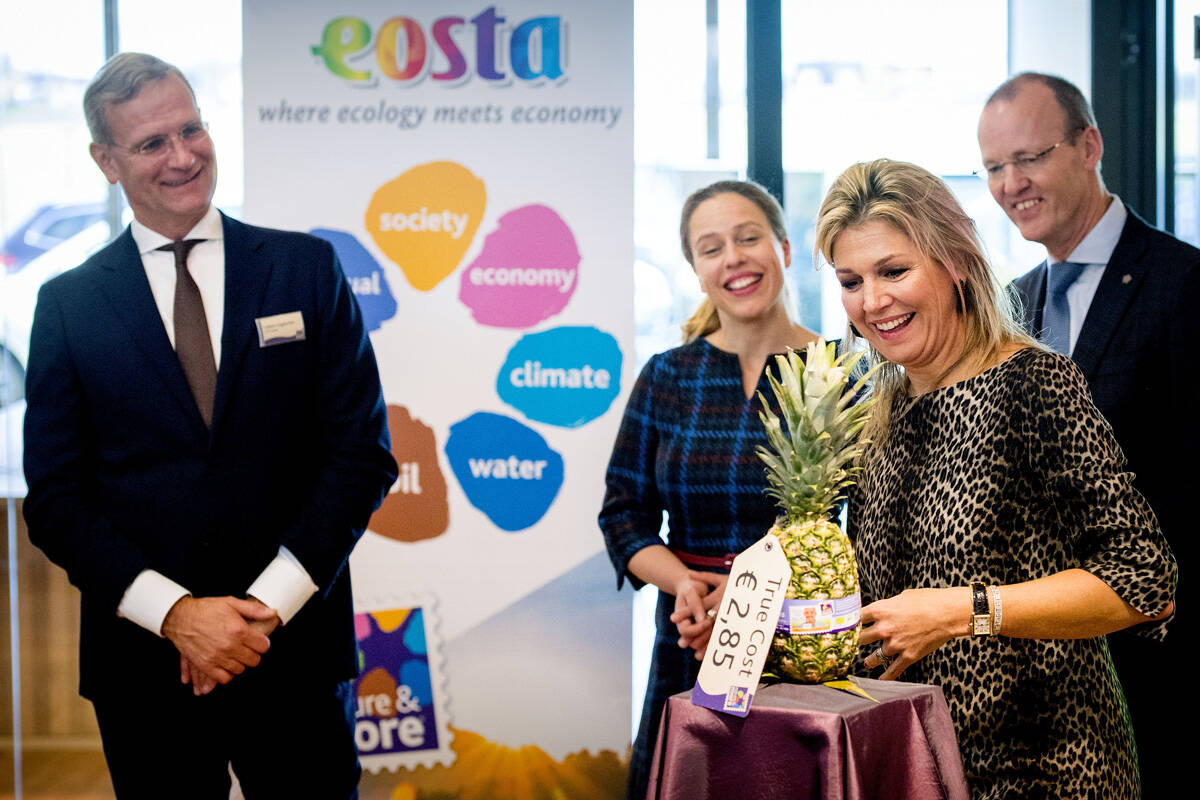
How exactly does the true cost idea work?
“We don't pay enough attention to the fact that sustainability starts in our heads and minds. The ecological crisis and the growing wealth gap hold up a mirror, in which we encounter the limitations of our own thinking. Al Gore called that, for lack of a better word, a spiritual problem. We looked at efficiency and yield maximization per hectare. We have now realized that it is useful to also maintain soil fertility, biodiversity and the climate. Let's embrace the idea that reality is greater than the sum of its parts. That a plant that’s grown large quickly with the help of substrate, fertilizer and LED light, may have less nutritional value than an organic crop that grows in the open ground with sunlight and in a varied ecosystem. An organism is distinguished from a machine by a wholeness in which life force and vitality are central.”
in what way should real change come about?
“Change and sustainability are usually always based on the actions and thoughts of a trendsetting minority, i.e. the smaller companies. The subsequent majority and the larger companies are needed to then scale that change. For example, the market must become a more leveled playing field, in which the polluter can no longer get away with a competitive advantage. The True Cost Accounting pilot we implemented with Eosta is a good example of this. Together with various UN clubs, consultancy and accountancy firm EY, retailers, producers and banks, we have calculated the social costs of organic and conventional production per product. This does not only concern the costs of climate warming, loss of biodiversity or water and soil pollution, but also health costs. After all, 70% of our health costs are food related. You can see from the pilot that the crisis is acute and that the so-called efficient intensive agriculture is not at all as efficient when you include the billions in social damage.”

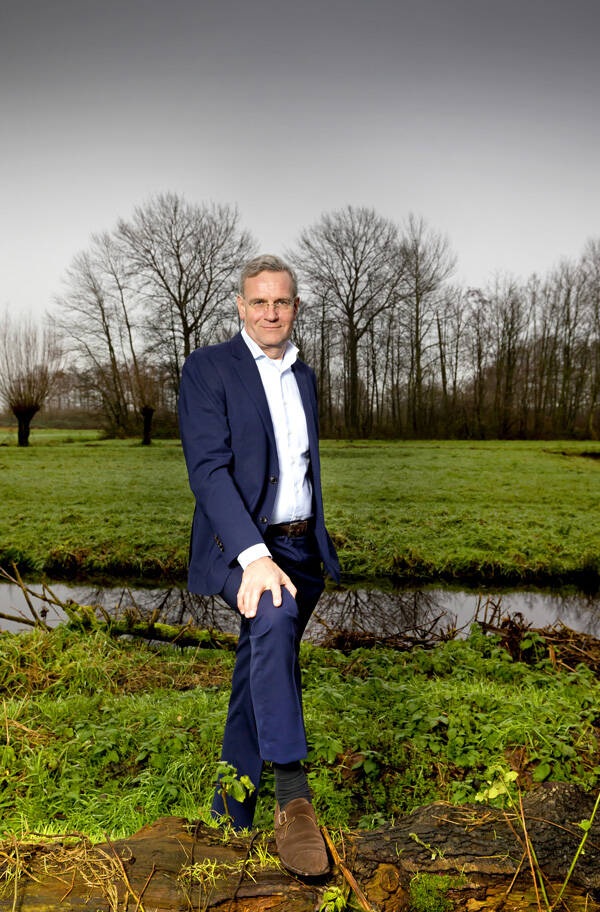
What do you mean with ‘the great reset’?
“The great reset is a development in which personal health, social inclusion and ecological sustainability are central. Judges remind Shell of its social duty of care. The European Union recently presented substantial sustainability plans. Sustainability is starting to sink into the DNA of legislators.”
“It also applies to the financial world. Sustainability goals for your business are now standard. The impact on people and the environment is not only measured, but also increasingly monetized. It's only a matter of time before shareholders demand more than just short-term profits. They want to know how viable you are in the longer term.”
What has changed in the field of sustainability in the past 30 years?
“A huge revolution has taken place. 30 years ago the Wall of Berlin had just fallen, Mandela was just released and Al Gore decided to make the environment one of the main themes of his campaign. The first Rio Earth Summit took place and the UN's IPCC (Intergovernmental Panel on Climate Change) was born. Organic food was still marginal at the time. The supermarkets were actively resisting inclusion in their range. They thought it was a risk to include products that were healthier and more sustainable, because what message would it project onto the rest of the range? Probably something in the line of that, almost everything else they were selling, was unhealthy and polluting. They didn't want to give consumers that signal."
“In the early 1990s, a trendsetting minority realized that the way we produce food was very profitable in the short term, but a dead end in the long term, because intensive cultivation depletes the soil. Even besides the animal suffering caused by regular intensive farming. The first dominoes in a long line then fell over. It was the beginning of the great reset.”
Who is Volkert Engelsman?
Engelsman runs the organic fruit and vegetable company Eosta, based in the Netherlands. The company is a European leader in the trade of organic fruit and vegetables. In addition to his job as CEO, Engelsman is a true advocate of the sustainable revolution in food.
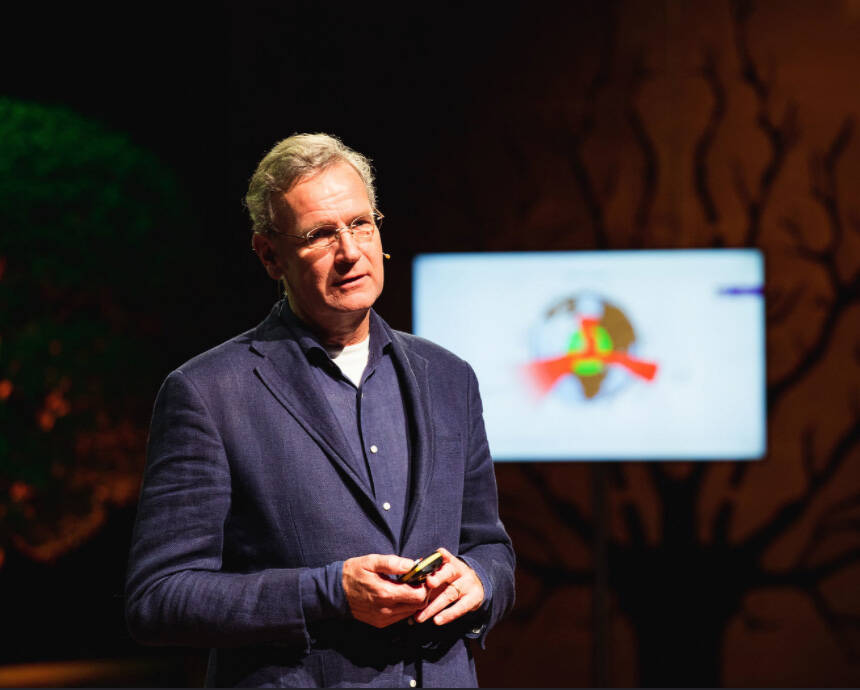
5 questions to Volkert Engelsman, a pioneer in sustainability
Maaike de Reuver Volkert Engelsman Xiao Er Kong
He runs an international company in fruit and vegetables, but Volkert Engelsman is best known in Europe for his radical insights and statements about the future of our food system. According to him, we should and can act more sustainably if we move towards a system where we pay the real price for the products we consume.
A greengrocer with a vision for the future
interview
5 min
a greengrocer with a vision for the future
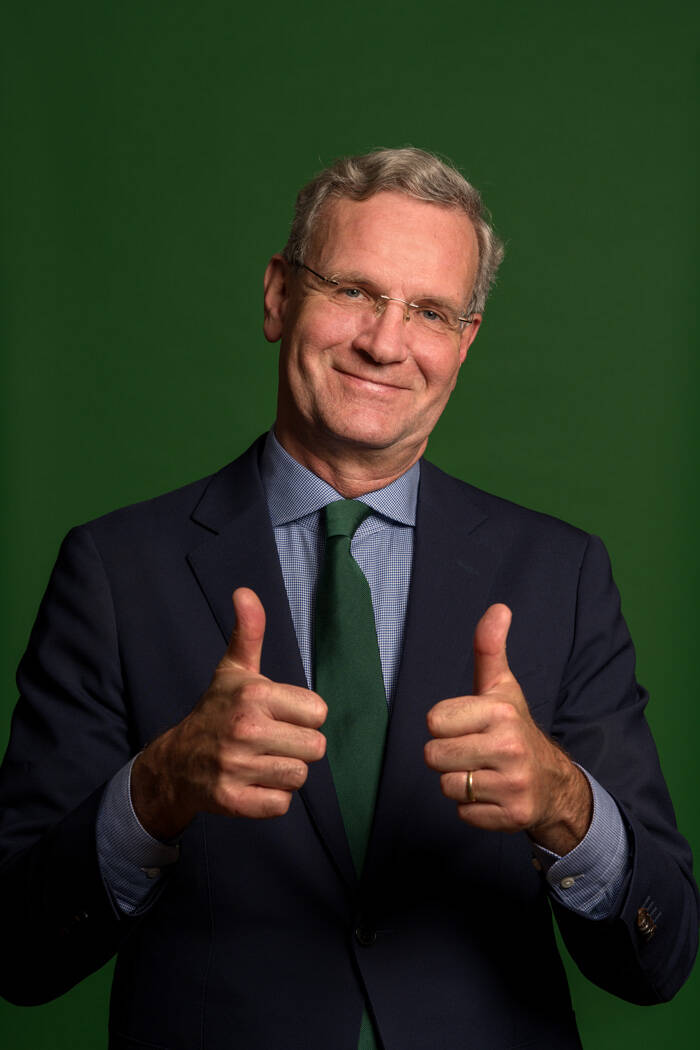

The Dutch Queen Maxima visiting Eosta looking at a pineapple with a True Cost price tag
© ANP
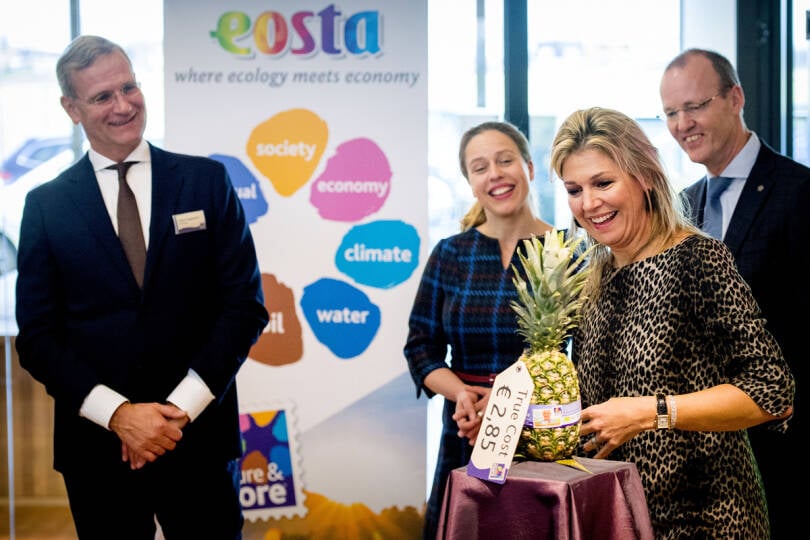
“The wealth gap is another big problem that can't wait. The old normal says that we need genetic engineering, fertilizers and pesticides to keep food affordable for the less fortunate, for example to produce enough food in Africa. But let's avoid exporting the short-term profit model to Africa. Feeding the world starts with a fair distribution of wealth. It will not improve if we make the developing world even more dependent on first world suppliers of fertilizers, agrochemicals and genetic engineering. The yield improvement they claim is often realized on the back of soil fertility, biodiversity and the disease-resistant capacity of crops. If we really want to help, we should stimulate their own revenue model instead of that of the suppliers.”
What can and should we change in the short term?
“We need to accelerate phasing out intensive agriculture and the parasitic agrochemicals, fertilizer and animal feed suppliers. At the same time, we must stimulate nature-inclusive circular agriculture in which people and the environment stand central. This is perfectly possible and has been sufficiently proven by organic farming. This automatically means that we limit our meat consumption to the amount that a closed loop system allows. If we do so, we’ll have no food problem at all. We’ll have a conversion problem. If we eat plant-based food, we can use ten to twenty times as much of our food.”
How exactly does the true cost idea work?
“We don't pay enough attention to the fact that sustainability starts in our heads and minds. The ecological crisis and the growing wealth gap hold up a mirror, in which we encounter the limitations of our own thinking. Al Gore called that, for lack of a better word, a spiritual problem. We looked at efficiency and yield maximization per hectare. We have now realized that it is useful to also maintain soil fertility, biodiversity and the climate. Let's embrace the idea that reality is greater than the sum of its parts. That a plant that’s grown large quickly with the help of substrate, fertilizer and LED light, may have less nutritional value than an organic crop that grows in the open ground with sunlight and in a varied ecosystem. An organism is distinguished from a machine by a wholeness in which life force and vitality are central.”
in what way should real change come about?
“Change and sustainability are usually always based on the actions and thoughts of a trendsetting minority, i.e. the smaller companies. The subsequent majority and the larger companies are needed to then scale that change. For example, the market must become a more leveled playing field, in which the polluter can no longer get away with a competitive advantage. The True Cost Accounting pilot we implemented with Eosta is a good example of this. Together with various UN clubs, consultancy and accountancy firm EY, retailers, producers and banks, we have calculated the social costs of organic and conventional production per product. This does not only concern the costs of climate warming, loss of biodiversity or water and soil pollution, but also health costs. After all, 70% of our health costs are food related. You can see from the pilot that the crisis is acute and that the so-called efficient intensive agriculture is not at all as efficient when you include the billions in social damage.”
What do you mean with ‘the great reset’?
“The great reset is a development in which personal health, social inclusion and ecological sustainability are central. Judges remind Shell of its social duty of care. The European Union recently presented substantial sustainability plans. Sustainability is starting to sink into the DNA of legislators.”
“It also applies to the financial world. Sustainability goals for your business are now standard. The impact on people and the environment is not only measured, but also increasingly monetized. It's only a matter of time before shareholders demand more than just short-term profits. They want to know how viable you are in the longer term.”
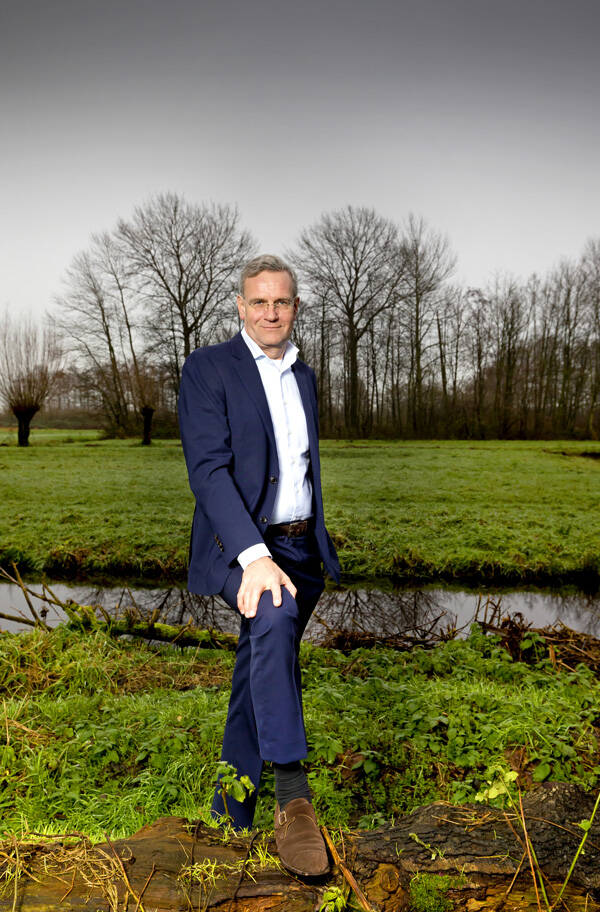
What has changed in the field of sustainability in the past 30 years?
“A huge revolution has taken place. 30 years ago the Wall of Berlin had just fallen, Mandela was just released and Al Gore decided to make the environment one of the main themes of his campaign. The first Rio Earth Summit took place and the UN's IPCC (Intergovernmental Panel on Climate Change) was born. Organic food was still marginal at the time. The supermarkets were actively resisting inclusion in their range. They thought it was a risk to include products that were healthier and more sustainable, because what message would it project onto the rest of the range? Probably something in the line of that, almost everything else they were selling, was unhealthy and polluting. They didn't want to give consumers that signal."
“In the early 1990s, a trendsetting minority realized that the way we produce food was very profitable in the short term, but a dead end in the long term, because intensive cultivation depletes the soil. Even besides the animal suffering caused by regular intensive farming. The first dominoes in a long line then fell over. It was the beginning of the great reset.”
Who is Volkert Engelsman?
Engelsman runs the organic fruit and vegetable company Eosta, based in the Netherlands. The company is a European leader in the trade of organic fruit and vegetables. In addition to his job as CEO, Engelsman is a true advocate of the sustainable revolution in food.
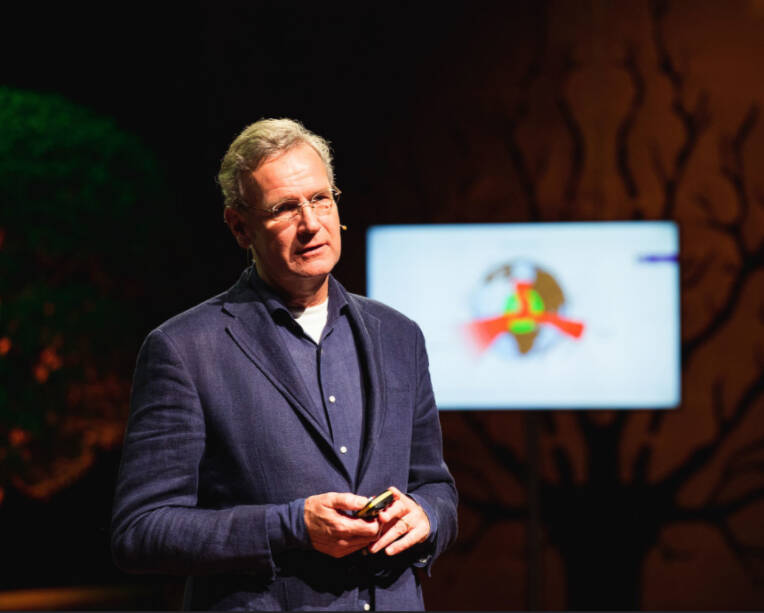
Maaike de Reuver Volkert Engelsman Xiao Er Kong
He runs an international company in fruit and vegetables, but Volkert Engelsman is best known in Europe for his radical insights and statements about the future of our food system. According to him, we should and can act more sustainably if we move towards a system where we pay the real price for the products we consume.
5 questions to Volkert Engelsman, a pioneer in sustainability
A greengrocer with a vision for the future
5 min
